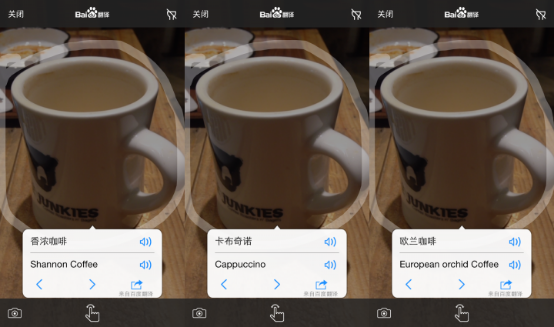By Tom McGregor, CCTV.com Panview commentator and editor
In recent years, the Chinese have traveled abroad in rising numbers. The remarkable economic growth and development of the nation has inspired hundreds of millions to visit overseas destinations.
Nonetheless, a huge number of Chinese struggle to learn new languages, including English, and face cultural restrictions when heading to foreign lands.
Few people outside China, can understand written or oral Chinese and even if people from other countries would like to be helpful, the huge language barrier makes it nearly impossible.
But Baidu, China's largest search engine company and the nation's leading Artificial Intelligence (AI) developer, has introduced a new translation services APP in August 2017 that works in partnership with China-based travel agency Ctrip.
The Chinese can get instant translations by taking photos, using voice recognition or texting characters.
Upgrades on OCR
Baidu opened up an AI Research and Development (R&D) lab in Silicon Valley and has achieved remarkable results on Deep Learning. The Chinese company has also made significant progress on OCR (optical character recognition).
OCR, via AI, can view an image through a smartphone and translate it into Chinese characters. Let's say, you are a Chinese tourist visiting New Orleans and curious about what food people are eating at a famous restaurant at the French Quarter.

(Taking a photo of the food or drink with the APP, then both Chinese and English translation pop out Photo from TECHINASIA)
You open up Baidu's translation APP and take a photo of the food served on a plate. The APP will tell you in Chinese what's on the menu.
The APP is even easier to use for those who had formerly relied on electronic dictionaries. In such instances, they had to type in English language characters before they could receive the Chinese translation.
APP for independent journeys
When the Chinese took vacation trips overseas with family, they were likely to join tour groups, since the guide was bilingual. But tours are tightly-organized, not permitting participants to roam freely.
The Baidu translation APP gives Chinese travelers the independence they crave. Tech experts say that soon the APP will provide more accurate translations than humans could.
According to a report published by the China Tourism Academy and Ctrip, over 62 million Chinese took a trip abroad in the first half of 2017, a five percent year-on-year increase. 54 percent traveled independently and the other 42 percent went on group tours.
Even before the new translation APP was introduced, Baidu had performed more than 100 million translations daily on its search engine, which had become one of the most popular tools for users.
Baidu Translate Team
The Beijing-based Baidu Translate Team started in 2010 and launched projects on June 2011. The company hired a few dozen members, who are mainly algorithm engineers and software developers.
The team works with Baidu's National Language Processing (NLP) led by Wang Haifeng, the firm's vice president of technology, a computer linguist by training, as reported by Slator.com.
"Machine translation is one of the directions of the Baidu NLP team, which is one of the largest NLP R&D groups in the world," said a Baidu representative. "It covers most of the directions in the NLP field, including morphology analysis, syntax parsing, semantic analysis, summarization, natural language generation, question answering, machine translation, dialogue modeling and so forth."
In other words, you can voice record and still get an adequate translation even if the speaker fails to use proper grammar and talks with slang in local accent and dialect.
Better than Google
The most popular used computer-generated translation service worldwide comes from Google. But Baidu has introduced new upgrades in OCR and can translate 27 languages into Chinese with nations that have close ties with Beijing.
"Baidu Translate is based on deep learning technologies," a Baidu rep told Slator.com. "A completely different method from the most popular open source phrase-based machine translation system. It performs much better."
The Baidu Translate Team had embedded Deep Learning technologies into a machine-based translation system, while adding statistical systems to improve translation quality.

(Taking a photo of the toy with the APP, then both Chinese and its English translation pop out Photo from TECHINASIA)
The translation APP continues to improve as Baidu’s digital secretary, serves as its platform. Other features include: Baidu Library, Baidu Encyclopedia and Baidu Browser.
The APP combines the best of OCR image recognition, voice translations and Big Data to transmit very accurate Chinese language translations.
Bright future ahead
Baidu has made significant progress on translation services, especially considering that Google and Waygo had been way ahead of the Chinese company before a translation team was formed in Beijing in 2010.
Despite the slow start, Baidu has caught up with Google and in many ways has surpassed the Silicon Valley corporate giant. Many believe that in the years ahead the Chinese search engine company could become bigger than Google.
Baidu has discovered new avenues to generate revenues from its translation services APP, while also transmitting user information into Big Data reports.
Companies, such as retailers who are doing business in China, should link up with Baidu to obtain a better understanding of the China market.
Accordingly, developments in AI technology will be the key to unlock bigger revenues for Baidu.
(The opinions expressed here do not necessarily reflect the opinions of Panview or CCTV.com. )

Panview offers a new window of understanding the world as well as China through the views, opinions, and analysis of experts. We also welcome outside submissions, so feel free to send in your own editorials to "globalopinion@vip.cntv.cn" for consideration.
















